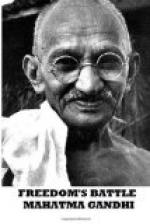At the outset let me assure Sir Narayan that I have not changed my views on Ahimsa. I still believe that man not having been given the power of creation does not possess the right of destroying the meanest creature that lives. The prerogative of destruction belongs solely to the creator of all that lives. I accept the interpretation of Ahimsa, namely, that it is not merely a negative State of harmlessness, but it is a positive state of love, of doing good even to the evil-doer. But it does not mean helping the evil-doer to continue the wrong or tolerating it by passive acquiescence. On the contrary love, the active state of Ahimsa, requires you to resist the wrong-doer by dissociating yourself from him even though it may offend him or injure him physically. Thus if my son lives a life of shame, I may not help him to do so by continuing to support him; on the contrary, my love for him requires me to withdraw all support from him although it may mean even his death. And the same love imposes on me the obligation of welcoming him to my bosom when he repents. But I may not by physical force compel my son to become good. That in my opinion is the moral of the story of the Prodigal Son.
Non-co-operation is not a passive state, it is an intensely active state—more active than physical resistance or violence. Passive resistance is a misnomer. Non-co-operation in the sense used by me must be non-violent and therefore neither punitive nor vindictive nor based on malice ill-will or hatred. It follows therefore that it would be sin for me to serve General Dyer and co-operate with him to shoot innocent men. But it will be an exercise of forgiveness or love for me to nurse him back to life, if he was suffering from a physical malady. I cannot use in this context the word co-operation as Sir Narayan would perhaps use it. I would co-operate a thousand times with this Government to wean it from its career of crime but I will not for a single moment co-operate with it to continue that career. And I would be guilty of wrong doing if I retained a title from it or “a service under it or supported its law-courts or schools.” Better for me a beggar’s bowl than the richest possession from hands stained with the blood of the innocents of Jallianwala. Better by far a warrant of imprisonment than honeyed words from those who have wantonly wounded the religious sentiment of my seventy million brothers.
My reading of the Gita is diametrically opposed to Sir Narayan’s. I do not believe that the Gita teaches violence for doing good. It is pre-eminently a description of the duel that goes on in our own hearts. The divine author has used a historical incident for inculcating the lesson of doing one’s duty even at the peril of one’s life. It inculcates performance of duty irrespective of the consequences, for, we mortals, limited by our physical frames, are incapable of controlling actions save our own. The Gita distinguishes between the powers of light and darkness and demonstrates their incompatibility.




